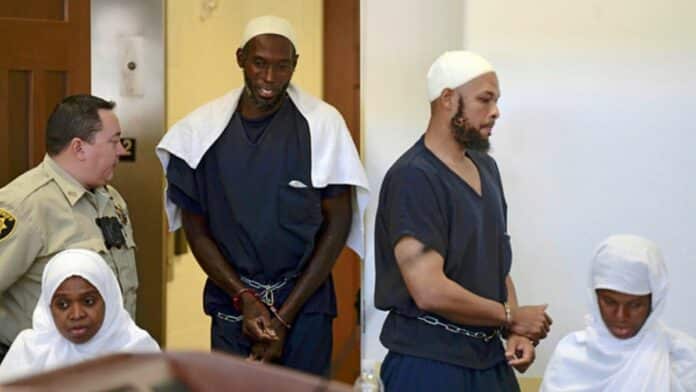In a heart-wrenching case that unfolded over several years, a 3-year-old boy from Jonesboro, Georgia, went missing, only to be discovered deceased hundreds of miles away in a desolate compound located in the northern reaches of New Mexico. This harrowing tale has culminated in the conviction of several family members on terrorism charges, leaving a trail of unanswered questions and shattered lives.
A Tragic Disappearance
In 2018, the disappearance of a young boy sent shockwaves through the small community of Jonesboro. The child had vanished without a trace, leaving family members and law enforcement in a frantic search to find him. Tragically, the boy’s journey would end in the most horrific circumstances.
Conviction on Terrorism Charges
Jurors in Albuquerque, New Mexico, reached a decisive verdict, finding the boy’s father, Siraj Ibn Wahhaj, guilty of terrorism charges that were a result of the search for the missing child. Their investigation led them to a squalid compound in northern New Mexico, where they uncovered a disturbing plot.
A Chilling Conspiracy
Prosecutors revealed a shocking motive behind the family’s sudden disappearance. It was alleged that Siraj Ibn Wahhaj and his family had fled with the toddler to an isolated region in the high desert to undergo firearms and tactical training, seemingly in preparation for acts of violence against the government. Their actions were inexplicably linked to a belief that the young boy would be resurrected as Jesus Christ and provide divine instructions.
Deliberations and Testimonies
After two and a half days of deliberation, jurors delivered their verdict. This complex case involved weeks of testimonies from children who had lived at the compound, family members, firearms experts, doctors, and forensic technicians. The defendants, who professed the Muslim faith, claimed that they were unfairly targeted by federal authorities due to their religious beliefs.
Also read: How a Playful Dog Put a 4-Year-Old’s Life in Danger!
A Family’s Involvement
The extent of the family’s involvement in this disturbing plot came to light during the trial. Siraj Ibn Wahhaj’s brother-in-law was also convicted on terrorism charges, as well as charges of conspiracy to commit kidnapping and kidnapping that ultimately led to the boy’s untimely demise. Wahhaj’s sisters were found guilty of kidnapping.
A Grisly Discovery
The grim discovery of the boy’s badly decomposed remains occurred in an underground tunnel on the outskirts of Amalia, near the Colorado state line. The exact cause of death remains a mystery, overshadowed by allegations that the child, who suffered from severe developmental disabilities and frequent seizures, had been denied vital medication.
A Prosecution’s Plea
During the closing arguments, Prosecutor George Kraehe emphasized that the heart of the case was Abdul-Ghani Wahhaj, the young boy. He implored everyone in the courtroom to remember the child’s name, repeating it while casting a solemn gaze at the defendants. As he did so, the boy’s mother, Hakima Ramzi, fled the courtroom in tears.
The Fleeing Family
The prosecution painted a vivid picture of the family’s hurried journey, as they fled from Georgia to Alabama and eventually to New Mexico, leaving nearly everything behind. They abandoned other family members who desperately attempted to reach out via numerous text messages, emails, and social media, pleading with them to return the boy home. The prosecution contended that they were on the run, aware that their actions were morally reprehensible.
A Complex Belief System
Siraj Ibn Wahhaj’s partner, Jany Leveille, a Haitian national, was initially charged with kidnapping and terrorism-related offenses. However, she reached a plea agreement related to weapons charges and did not participate in the trial. Prosecutors argued that Leveille was making decisions based on messages she claimed to receive from God, documented in a journal.
A Family’s Defense
Siraj Ibn Wahhaj chose to represent himself in court, asserting that the federal government had constructed a false narrative. He implored the jurors to focus solely on the facts as they deliberated the fate of himself, his two sisters, and his brother-in-law. He explained that their actions were driven by a desire to protect his son from what they perceived as spiritual attacks, utilizing a ritual known as ruqyah, which involved recitations from the Quran.
Maintaining Innocence
Defense attorneys for Hujrah and Subhanah Wahhaj contended that their clients played no part in the boy’s death. They maintained that the family had come to the compound to care for their own children, who were enduring harsh conditions, including cold temperatures and unforgiving winds. The defense presented evidence that one of the women had searched the internet for information on trapping squirrels and birds to supplement the family’s diet.
A “Sick End-of-Times Scheme”
Prosecutors argued that the women had become embroiled in a “sick end-of-times scheme” following the boy’s death. They claimed to possess “an avalanche of evidence” against all four defendants, asserting that the family had adopted unconventional beliefs that led them down a perilous path.
The Verdict and Sentencing
A sentencing date is yet to be scheduled, but the charges related to kidnapping resulting in death carry a mandatory life sentence. The charges of providing support for terrorist acts against U.S. government officials and employees could lead to up to 15 years in prison, while the charge of conspiracy to kill a government officer or employee carries a maximum sentence of life imprisonment.
In conclusion, this tragic case of a missing child turned into a nightmarish story of terrorism convictions that left a community in shock and a family torn apart. The heartbreak and unanswered questions surrounding the young boy’s death serve as a stark reminder of the consequences of radical beliefs and actions.

